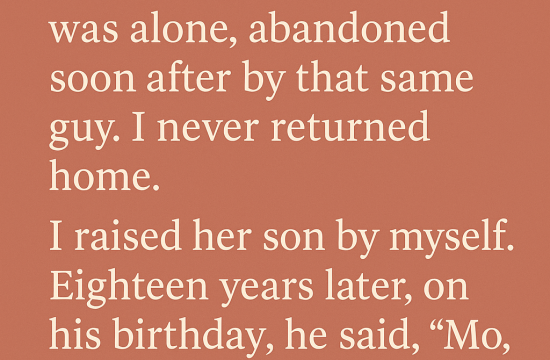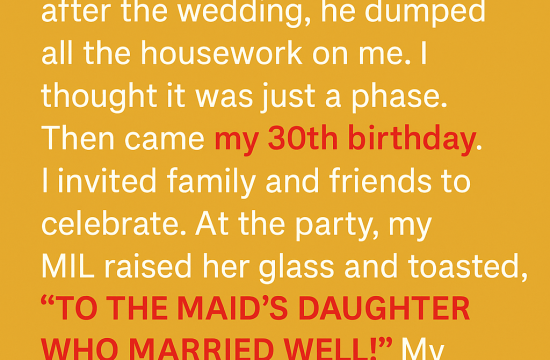My daughter recently got married, and said my house was perfect to start a family in. I live alone in a 4-bedroom apartment, so I gifted it to her and moved into a small cottage with my sister.
When I went to visit her, I was shocked to see that she had painted the living room neon orange and covered the hardwood floors with cheap carpet squares.
I didn’t say anything at first. After all, it was her home now. I reminded myself that once you give a gift, you lose control over it. Still, I had lived there for twenty-three years, and every corner of that apartment carried my memories. Seeing the walls blazing orange felt like watching someone graffiti over a diary I’d spent decades writing.
I told myself to let it go. But then, on my second visit, I noticed the kitchen table I had saved up for—the solid oak one my late husband and I picked together—was missing. I asked her about it, and she casually said she had sold it online because it “didn’t fit the new vibe.” I nodded, but my chest felt tight. That table had held birthday cakes, family arguments, and late-night cups of tea. It was worth more than money to me.
Her husband, Emil, was polite but distant. He never looked me straight in the eye, always scrolling on his phone while we spoke. Once, I overheard him joking to his friends that I was “too sentimental” about old furniture. My daughter, Liora, laughed along. That laugh cut deeper than I expected.
I tried to focus on the positives. At least they were happy together, or so I thought. But as months passed, I noticed cracks in their storybook life. When I stopped by unannounced, I often found the place messy—dirty dishes piled up, laundry scattered, unopened bills on the counter. Liora looked tired, her eyes ringed with shadows, but brushed off my concern, saying, “We’re just adjusting.”
One evening, she called me, her voice shaky. She asked if I could lend them some money to cover a “temporary situation.” When I pressed, she admitted Emil had quit his job to “start his own business,” but so far, it was just him sitting on the couch with his laptop. I didn’t like the sound of it, but I gave her what I could. A few weeks later, she asked again.
I decided to visit without warning. This time, the door wasn’t answered for a long while. When Emil finally opened it, the smell of smoke hit me—sweet, heavy, unmistakably not from cooking. He looked nervous, muttered something about “friends stopping by,” and blocked me from stepping inside. My stomach dropped.
Later that night, Liora came to my cottage. She looked pale, worn down. She admitted Emil had been throwing parties when she was at work. People she didn’t even know. He told her it was “networking” for his business idea. I wanted to scream, but instead I made tea and let her talk.
I thought maybe she’d finally see what was happening, but the next week, she told me she and Emil had “worked it out.” I stayed silent, though my heart ached. You can’t pull someone out of quicksand if they’re convinced it’s a swimming pool.
The real breaking point came months later. I stopped by again, hoping things had improved. Instead, I walked into chaos. Furniture pushed aside, beer cans everywhere, loud music shaking the walls. Emil was hosting a full-blown party at noon on a Sunday. My family’s old photographs were shoved into a box near the trash. I froze when I saw a stranger sitting on the armrest of my late husband’s recliner, spilling chips all over it.
I stormed out before anyone noticed my tears. That night, I told my sister, Sima, that I regretted giving them the house. She listened quietly, then said something that stuck: “Maybe the house isn’t the problem. Maybe it’s teaching you who your daughter has become.”
I didn’t sleep much. The next morning, I decided to confront Liora directly. When I arrived, Emil wasn’t there. I asked her point-blank if she was happy. She broke down, sobbing. She admitted Emil had racked up debt in her name, had lied about job opportunities, and sometimes shouted so loud the neighbors threatened to call the police. My heart broke hearing it, but there was also a tiny spark of relief—finally, she was telling me the truth.
I offered her a place at my cottage until she sorted things out. She hesitated, scared of Emil’s reaction, but eventually packed a small bag and came with me. For two weeks, she stayed silent most of the time, staring at the wall. Slowly, she began to open up. She told me Emil once pawned her grandmother’s ring to pay off a gambling debt. He always promised he’d replace it, but never did. That ring had been in our family for three generations.
I wanted to march over there and drag him out by the collar, but I knew that would only push Liora away again. Instead, I reminded her of her own strength. I told her how I’d survived after her father passed, how I learned to stand on my own two feet. She listened, sometimes with tears, sometimes with a weak smile.
The twist came when Emil showed up at my cottage one evening. He banged on the door, shouting her name. My sister locked the door, and I called the police. They came quickly, warning him to leave. Liora watched the whole thing from behind the curtain, shaking. That night, she whispered to me, “I think I’m done.”
A week later, she filed for separation. She also confessed something else: the only reason she agreed to marry Emil so quickly was because she felt pressured to settle down, and when he admired her confidence and independence, she mistook it for love. She realized too late that he wanted to dim her light, not share it.
With Emil gone, the house became a burden instead of a home. She decided to sell it, and with my blessing, she used part of the money to clear her debts and the rest to start fresh. She moved into a small apartment nearby, cozy and peaceful. For the first time in months, I saw her smile reach her eyes again.
One day, she came to my cottage carrying something wrapped in cloth. She handed it to me carefully. Inside was the oak table. She had tracked it down online and bought it back with her own savings. “I thought it was gone forever,” she said softly. “But some things deserve to come home.” I cried like a child, hugging her. That table sat in my cottage now, scratched and scarred but still standing—just like us.
Months later, Liora enrolled in a course she had always dreamed of—graphic design. She said she wanted to rebuild not just her finances but also her identity. I watched her sketching late at night, her face glowing in the lamplight, and felt proud in a way I hadn’t in years.
The biggest surprise came a year later, when she introduced me to someone new. His name was Rahim, a quiet man who worked as a carpenter. Unlike Emil, he looked me in the eye and shook my hand firmly. He listened more than he spoke. Over dinner, he admired the oak table, running his fingers over the grain. “Good wood,” he said. I smiled, knowing he saw what it meant.
This time, I didn’t rush to judge. I let things unfold. And slowly, I saw Liora bloom again. She laughed more, ate better, carried herself taller. It reminded me that sometimes the house we lose is nothing compared to the home we can rebuild within ourselves.
Looking back, I realized gifting that house wasn’t a mistake—it was a test. A painful, messy, necessary lesson that showed both of us where our boundaries were, and how to protect them. Liora learned she couldn’t let someone else dictate her worth, and I learned that letting go doesn’t mean disappearing. Sometimes it means standing by quietly until the storm passes, then helping gather the pieces.
If there’s one thing this journey taught me, it’s that love without respect is just a cage, and a house without peace is just walls. We both lost something in the process, but we also gained something stronger: the courage to start over, and the wisdom to know what truly matters.
So if you ever feel torn between holding on and letting go, remember—walls can be painted, furniture replaced, but your dignity and peace should never be up for sale.











